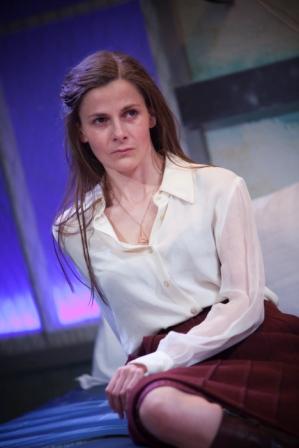The Trojan Women, Gate Theatre | reviews, news & interviews
The Trojan Women, Gate Theatre
The Trojan Women, Gate Theatre
Caroline Bird's adaptation of Euripides' tragedy sacrifices subtlety for anguish
Not even a cameo by Tamsin Greig can redeem this painful adaptation of Euripides' The Trojan Women. For an hour and a half it screams with anguish, verging at times on the parodic. The production is a puzzle. Caroline Bird has updated the language, stripping the original of much of its poetry and adding expletives.
Bird is faithful to the gist of the original, conveying the play's main point about the folly of battle. After the Trojan War, the captive women of Troy share their grief and learn about their fate as the Greeks' concubines and slaves. Women are the spoils of conflict. There's Hecuba, the fallen queen of Troy; Cassandra, her daughter; Andromache, her daughter-in-law; Helen of Troy, whose elopement with Paris caused the war; and the chorus, here played by a pregnant woman. By mixing the old (the gods) with the new (technology), Bird has created a detached world, one that is hard to understand.
 This production is framed by two bizarre cameos: the names are a coup for the Gate Theatre, but the dramatic device does not work. Greig, as Athena, the goddess of war, and Roger Lloyd Pack, as Poseidon, the god of the sea, flash up on small screens in a pre-recorded video at the start. They present a patronising prologue more suited to the classroom than the theatre. Lloyd Pack, with his sunglasses and cigarette, tells of the Greeks hiding inside a “massive rocking horse”, before Greig cuts in with “Wrap it up, Jackanory”.
This production is framed by two bizarre cameos: the names are a coup for the Gate Theatre, but the dramatic device does not work. Greig, as Athena, the goddess of war, and Roger Lloyd Pack, as Poseidon, the god of the sea, flash up on small screens in a pre-recorded video at the start. They present a patronising prologue more suited to the classroom than the theatre. Lloyd Pack, with his sunglasses and cigarette, tells of the Greeks hiding inside a “massive rocking horse”, before Greig cuts in with “Wrap it up, Jackanory”.
This jars with the rest of the play, which is all anguish and wretchedness. Dearbhla Molloy (pictured above) as Hecuba displays relentless outrage at being left “a queen without a city” and a childless widow. “What will I be now?” she wails. “Somebody's servant. Sewing the names of my enemy's children into their school shirts, arranging oven chips on a baking tray, a slave to the Greeks who massacred my people.” Molloy spends most of the time shouting. There is little nuance. Hecuba shares a room with the Chorus, a lower-class pregnant woman, who moves from despair to disorientated delirium after taking medication. The Chorus, played earnestly by Lucy Ellinson, spends much of the time crying.

The Trojan Women goes all out on such big gestures. Later a dead baby covered in blood is brought on stage. It seems to be done for shock value, but because of the flat characters it fails to move as much as it should. Christopher Haydon's direction is admirably adventurous, but scenes often become cluttered. Towards the end, one character is pointing a gun, another is shouting, another is on their knees and another is rushing in and out. It verges on the farcical.
rating
Explore topics
Share this article
Add comment
The future of Arts Journalism
You can stop theartsdesk.com closing!
We urgently need financing to survive. Our fundraising drive has thus far raised £49,000 but we need to reach £100,000 or we will be forced to close. Please contribute here: https://gofund.me/c3f6033d
And if you can forward this information to anyone who might assist, we’d be grateful.

Subscribe to theartsdesk.com
Thank you for continuing to read our work on theartsdesk.com. For unlimited access to every article in its entirety, including our archive of more than 15,000 pieces, we're asking for £5 per month or £40 per year. We feel it's a very good deal, and hope you do too.
To take a subscription now simply click here.
And if you're looking for that extra gift for a friend or family member, why not treat them to a theartsdesk.com gift subscription?
more Theatre
 Mary Page Marlowe, Old Vic review - a starry portrait of a splintered life
Tracy Letts's Off Broadway play makes a shimmeringly powerful London debut
Mary Page Marlowe, Old Vic review - a starry portrait of a splintered life
Tracy Letts's Off Broadway play makes a shimmeringly powerful London debut
 Little Brother, Soho Theatre review - light, bright but emotionally true
This Verity Bargate Award-winning dramedy is entertaining as well as thought provoking
Little Brother, Soho Theatre review - light, bright but emotionally true
This Verity Bargate Award-winning dramedy is entertaining as well as thought provoking
 The Unbelievers, Royal Court Theatre - grimly compelling, powerfully performed
Nick Payne's new play is amongst his best
The Unbelievers, Royal Court Theatre - grimly compelling, powerfully performed
Nick Payne's new play is amongst his best
 The Maids, Donmar Warehouse review - vibrant cast lost in a spectacular-looking fever dream
Kip Williams revises Genet, with little gained in the update except eye-popping visuals
The Maids, Donmar Warehouse review - vibrant cast lost in a spectacular-looking fever dream
Kip Williams revises Genet, with little gained in the update except eye-popping visuals
 Ragdoll, Jermyn Street Theatre review - compelling and emotionally truthful
Katherine Moar returns with a Patty Hearst-inspired follow up to her debut hit 'Farm Hall'
Ragdoll, Jermyn Street Theatre review - compelling and emotionally truthful
Katherine Moar returns with a Patty Hearst-inspired follow up to her debut hit 'Farm Hall'
 Troilus and Cressida, Globe Theatre review - a 'problem play' with added problems
Raucous and carnivalesque, but also ugly and incomprehensible
Troilus and Cressida, Globe Theatre review - a 'problem play' with added problems
Raucous and carnivalesque, but also ugly and incomprehensible
 Clarkston, Trafalgar Theatre review - two lads on a road to nowhere
Netflix star, Joe Locke, is the selling point of a production that needs one
Clarkston, Trafalgar Theatre review - two lads on a road to nowhere
Netflix star, Joe Locke, is the selling point of a production that needs one
 Ghost Stories, Peacock Theatre review - spirited staging but short on scares
Impressive spectacle saves an ageing show in an unsuitable venue
Ghost Stories, Peacock Theatre review - spirited staging but short on scares
Impressive spectacle saves an ageing show in an unsuitable venue
 Hamlet, National Theatre review - turning tragedy to comedy is no joke
Hiran Abeyeskera’s childlike prince falls flat in a mixed production
Hamlet, National Theatre review - turning tragedy to comedy is no joke
Hiran Abeyeskera’s childlike prince falls flat in a mixed production
 Rohtko, Barbican review - postmodern meditation on fake and authentic art is less than the sum of its parts
Łukasz Twarkowski's production dazzles without illuminating
Rohtko, Barbican review - postmodern meditation on fake and authentic art is less than the sum of its parts
Łukasz Twarkowski's production dazzles without illuminating
 Lee, Park Theatre review - Lee Krasner looks back on her life as an artist
Informative and interesting, the play's format limits its potential
Lee, Park Theatre review - Lee Krasner looks back on her life as an artist
Informative and interesting, the play's format limits its potential
 Measure for Measure, RSC, Stratford review - 'problem play' has no problem with relevance
Shakespeare, in this adaptation, is at his most perceptive
Measure for Measure, RSC, Stratford review - 'problem play' has no problem with relevance
Shakespeare, in this adaptation, is at his most perceptive

Comments
A most unfair review, I
Wow. That's a serious taste